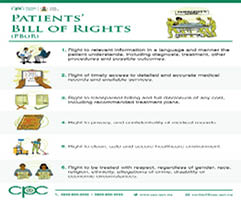It is a sad reality that patients in Nigeria sometimes lose their lives due to negligence by some healthcare workers.
According to Martins Nwanne, the founder of Disney Nwanne Foundation (DNF), death caused by medical negligence could last a lifetime.
Speaking during this year’s remembrance ceremony of his daughter’s death, he said, “The emotional damage caused as a result of such misconduct lasts a lifetime. The pain never goes away. We live with such pain in a world that is difficult already.
“We must refuse to be politically correct in decisions and policies in our health sector as lives are involved. If we do not answer to many, we will surely answer to God”.
NCSCN Commends FG, Customs Over Cancellation Of 25% Penalty On Imported Vehicles
FG committed to making Nigeria hub for African innovation – Minister
The death of his daughter, Disney Nwanne, in 2020 was one of the many tragic cases of patients who died in avoidable circumstances in hospitals due to alleged negligence.
Her death was far from an isolated incident because far too often, Nigerians suffer from inadequate attention due to the negligence of people who are tasked with saving their lives in medical facilities.
Healthcare workers in Nigeria must be held to a higher standard, with greater emphasis placed on education, training, and respect for their patients.
For four years, Mr Martins Nwanne remembers his daughter, Disney’s death to create awareness about the need to improve the healthcare system in the country and to reduce the deaths of Nigerians in the hands of a few negligent health workers in hospitals around the country.
After her death in the year 2020, he set up the Disney Nwanne Foundation (DNF), a not-for-profit organization to give voice to all Nigerians through advocacy and stakeholder engagement to create awareness about the rights of patients regarding their treatments by healthcare workers.
At this year’s ‘Day of the Disneys 2024’ held in the first week of March with the Theme ‘Domesticating And Enforcing Patients Rights’, the issue of ‘Patients Bill Of Rights’ was brought to the fore by the Federal Competition and Consumer Protection Commission (FCCPC) whose officials were present to educate Nigerians on their rights as patients.
The Director, Consumer Education, FCCPC, Dorcas Olubunmi said, the commission had in collaboration with the Federal Ministry of Health developed the ‘Patients’ Bill of Rights’ to protect them.
She said, “The PBoR is an aggregation of patients’ rights existing in other instruments, including the constitution, consumer protection acts, child rights Act, National Health Act, the Hippocratic Oath, other professional, ethical code and sundry regulations”.
She said, despite the structures in place, the quality of healthcare remains a significant concern for many Nigerians as they face various challenges hindering their access to quality healthcare.
Olubunmi said, to address the issue, the FCCPC has initiated a partnership with health professional associations, civil society organizations (CSOs), and the Federal Ministry of Health to introduce the PBoR which, she said, is the first-ever legislation of its kind in Nigeria.
The FCCPC director added, “The PBoR empowers patients and holds healthcare providers accountable. It articulates 12 patient rights and responsibilities, covering crucial aspects such as the right to information, timely access to medical records, transparent billing, privacy and the right to quality care.”
The 12 provisions of PBoR include; Access to information; patient-related information; fee-related information; confidentiality; quality of care; patient’s dignity; access to emergency care; visitation; patient’s refusal of care; interruption of service by provider and complaints.
According to her, the PBoR has clearly spelt out the responsibilities of patient and the healthcare provider vis-a-vis the rights which stated that, the number one provision is that, patients must have access to all relevant information in a language that he understands.
Information about diagnosis, treatment, prognosis, procedures and possibly outcomes must be made available to the patient and he must fully participate in the implementation of the treatment plan and decision-making.
Another provision contained in the PBoR was that a patient must have access to records including explicit information about the range and scope of service available. Access to record of the identity, skills and credentials of treating professionals and care providers published by federal/state ministries of health or other relevant authorities.
The privacy and confidentiality of all patients’ information and medical records must be maintained unless if their disclosure is vital and in the interest of public health in accordance with the law.
The PBoR further demands that, patients’ dignity must be respected by being treated with dignity and respect ‘without prejudice to gender, religion, race, ethnicity, allegation of crimes, geographical location, disability or socio-economic circumstances’.
His prior wishes in the absence of his next of kin (where applicable) are to be respected to the fullest during his last offices or at the time of death to the extent consistent with the law.
A patient is also entitled to access to emergency care by receiving urgent, immediate and sufficient intervention and care in the event of an emergency.
The PBoR prioritises giving the patient the needed attention over other things like costs, payments as well as law enforcement requirements.
Patients also have the right to consent or decline participation in medical research, procedures or clinical trials in the course of treatment.
The patient also has the full right to express his dissatisfaction regarding the service or provider including personnel changes or abuse.
If he is dissatisfied with outcomes, he can report to appropriate regulatory authorities like the Medical and Dental Council of Nigeria (MDCN) and subsequently to FCCPC if he is not satisfied with the additional interventions.
A former Nigerian High Commissioner to Canada and Mexico, Professor Iyorwuese Hagher said, Nigerians should not be shocked by the number of Nigerian doctors and nurses who have left the country and are practising all over the world.
“Amazingly, even when they leave Nigeria as just average, when they go to Saudi Arabia, United Kingdom, USA and Canada, we find ordinary Nigerian Doctors doing great things, excelling in their various fields and specialisations.
“It’s not too much for Nigeria to give the citizens better healthcare than what we have.”

 Join Daily Trust WhatsApp Community For Quick Access To News and Happenings Around You.
Join Daily Trust WhatsApp Community For Quick Access To News and Happenings Around You.


